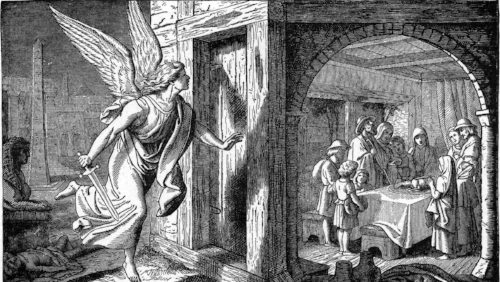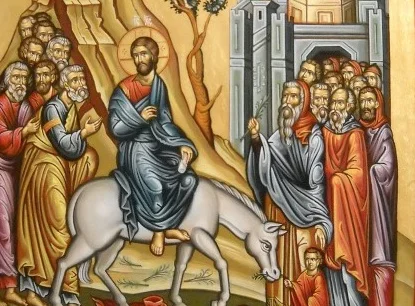And on the way, at a place where they spent the night, YHWH met him and tried to kill him. But Zipporah took a flint knife and cut off her son’s foreskin, and touched his “feet” with it, and said, “Truly you are a ḥatan damim to me!” So he let him alone. It was then she said, “A ḥatan damim by circumcision.” (Exodus 4:24-26, our translation)
Exodus 4:24-26 is widely considered one of the most enigmatic and difficult to interpret passages of Scripture in the Hebrew Bible. So of course we decided to tackle it. Among the myriad issues and confusions with interpreting this text, let’s focus on four:
1. Who? (Pronoun confusion) ~ There are no antecedents for the male pronouns in this passage. It is not always clear who “he” or “him” refers to the five times they appear in this text. At times it could be Moses, Moses’ son, or YHWH. Because of this . . .
2. Who is going to die? ~ Is Moses the target of divine wrath or is it his son?
3. What’s the deal with the sudden circumcision and airborne foreskin?
4. What does ḥatan damim mean? ~ These are the Hebrew words most translations render as “bridegroom of blood” or “bloody husband” in verses 25 and 26. But what does that even mean?
I. On Antecedents and Death Sentences
YHWH met him and tried to kill him
The two most popular (and logical) readings are “YHWH met Moses and tried to kill Moses” and “YHWH metMoses and tried to kill Gershon [Moses’ first born son, the one who got circumcised].” Thus our second pair of pronouns— So he let him alone— should most likely be understood as, “so YHWH let [whoever He was going to kill] alone.” Again, we will argue below that the Gershon was the one in imminent danger. But before we turn to the nature of Zipporah’s saving actions, let’s talk about “feet.”
As we’ve discussed elsewhere “feet” is a recognized euphemism for genitals in the Bible (cf. Ex 4:25, Judges 3:24, 1 Sam 24:4, Isaiah 6:2, and Isaiah 7:20). While it is arguable that this passage is referring to literal feet, given that the context is circumcision, a euphemistic usage seems to stand a little straighter. Regardless, whether walking feet, penis “feet” (you’re welcome for that image), or metaphorical feet, the question remains of what Zipporah did with the foreskin. The text says Zipporah “touched his feet with it.” Whose? Our options: Moses’ “feet,” Gershon’s “feet,” or YHWH’s “feet” [and no, that last one is not original to us, though we kind of wish it was]. We believe Moses’ and here’s why.
II. On All Manner of Bloody Things
In some manner YHWH arrives at the door: as a sudden illness, as a physical manifestation, as the pre-incarnate Jesus who is really pissed off at Moses [again, we didn’t come up with that one], or an ambulatory burning bush, we have no idea, but the divine presence threatens death to this family. Zipporah, Midian priestess that she is (see Exodus 2), somehow knows that circumcision will save her family. So she hastily performs the ceremony on her son (ouch). Many reasons have been suggested for why Gershon was not circumcised in the first place, but we will forego those for now to get to the heart of the matter. This tale of Moses’ brush with death is tied to the verses which precede it, and another rite of blood concerning first born sons later in Exodus— the institution of Passover and the tenth plague upon Egypt.
In Exodus 4:21-23 YHWH told Moses to return to Egypt, perform miracles, and tell Pharaoh, “Thus says the Lord: Israel is my firstborn son…let my son go that he may worship Me. But you refused to let him go; now I will kill your firstborn son.” In Exodus chapter twelve YHWH makes good on His promise; every household which does not have the blood of the lamb on its doorposts and lintel will lose their first born son.
The parallels between chapter four and twelve are apparent and create a simple chiasm:
Warning of death for first born sons (Exodus 4:21-23)
Rite involving blood and lives are spared (Exodus 4:24 -26)
Rite involving blood and lives are spared (Exodus 12:1-28)
Death of first born sons (Exodus 12:29-32)
A closer look at the Hebrew employed in these passages support this reading:
But Zipporah took [laqach] a flint knife and cut off her son’s foreskin, and touched [naga’ ] his feet with it, and said, “Truly you are a bridegroom of blood [damim] to me!” So he let him alone. It was then she said, “A bridegroom of blood [damim] by circumcision.” (Exodus 4:25)
Then Moses called all the elders of Israel and said to them, “Go, select [laqach] lambs for your families, and slaughter the Passover lamb. Take [laqach] a bunch of hyssop, dip it in the blood [dam] that is in the basin, and touch [naga’ ]the lintel and the two doorposts with the blood [dam] in the basin. None of you shall go outside the door of your house until morning. For the Lord will pass through to strike down the Egyptians; when he sees the blood [dam] on the lintel and on the two doorposts, the Lord will pass over that door and will not allow the destroyer to enter your houses to strike you down.” (Exodus 12:21-23)
And in both, once the blood is applied (naga’), the fury of YHWH passes and the first born son is spared (c.f. Exodus 4:26 & Exodus 12:23). This is why we affirm that it was Gershon, the first born son, whose life hung in the balance, and that Zipporah threw the severed foreskin at Moses’ “feet.” It wouldn’t make sense for her to throw the foreskin back at Gershon and then yell at Moses, nor would it make sense (as some have argued) for her to yell at her son [“You almost got your father killed by YHWH, for something that was completely not your fault! Stupid kid, you should have circumcised yourself when you were 8 days old! Didn’t you read Genesis 17?!”] In both passages the blood serves as protection to keep YHWH and “the destroyer” (ham-maŝaḥît ) at bay. [With all this talk about blood, first born sons, and being rescued, better Christians than us would attempt to make New Testaments connections to Jesus’ crucifixion and posit an atonement theory. We’re not those Christians today.] This yelling brings us to the final question: what does ḥatan damim mean? Strap in for an Ancient Near East linguistic throw down!
ḥatan
The linguistic stem is ḥ-t-n. In Arabic, like Hebrew, this stem is related to words surrounding circumcision, people related by marriage (e.g. groom, in-laws), and protection. For example, the Arabic word for “father-in-law” literally means “a circumciser.” In other words, the bride’s father performed the circumcision on his soon to be son-in-law. The Hebrew word for father-in-law (ḥōtēn) reflects the same. This pattern for ḥ-t-n words being related to marriage relationships, protection, and circumcision is also seen in Aramaic, Akkadian, Syriac, and Ugaritic. Put another way: to be a “son-in-law,” to be a “bridegroom,” is to be “circumcised.”
damim
The root dam simply means “blood” all over the Hebrew Bible, but sometimes carries an association with “guilt.” The first usage of the word in the Bible, is also the earliest example of the guilt association; when Cain killed his brother Abel (we have a Card Talk about that sad event), YHWH says that Abel’s blood (dam) screams from the ground. Whenever the Bible speaks of the shedding of innocent blood this word is used, which is why most modern translations render dam and damim as “bloodguilt” or “guilty of bloodshed” (consider Deuteronomy 19:10). It can be read into Zipporah’s words as well.
The Bible is nothing if it is not punny and that’s nothing to laugh at (see what we did there?). The number of Biblical passages that operate on multiple linguistic levels is myriad. Zipporah’s pissed off, mother-bear response is no different. On the surface, it makes no sense for Zipporah to use the word ḥatan for Moses as they are already married. It is not the word for “husband,” it denotes the state before marriage as most translations attest. She uses this word, with its meanings of circumcision and marriage relationships, because it conjures the linguistics of the act that she just performed, circumcision. In addition it is a smack in Moses’ face for acting like an unseasoned boy rather than a man, a husband— consider all his whining in the preceding chapter when God wants Him to go back to Egypt. Furthermore, why the sheol wasn’t Gershon already circumcised?
She employs damim not only because of the literal blood which has been shed and spread around the room, but also because Moses is guilty. Her family was about to meet the same fate as Pharaoh’s in Exodus 12 because Moses hadn’t done his job. Zipporah took the flint knife, circumcised her son, and threw the foreskin at Moses’ junk.
“Are you kidding me?! Some groom you turned out to be! Look at this blood and look at your guilt because of this circumcision!”
Perhaps we all have work to do that is being hindered by work we have left undone.
Perhaps that work is right in front of us and someone else needs to give us an abrupt reminder.
But what do we know? We made this game and you probably think we’re going to Hell.



![O Come, O Come Emmanuel (Isaiah 7:14) [An Advent Card Talk]](https://images.squarespace-cdn.com/content/v1/55a9a1e3e4b069b20edab1b0/1483161046976-X5VJE3CMP9T957O72EII/3d-wallpapers-light-dark-wallpaper-35822.jpg)

